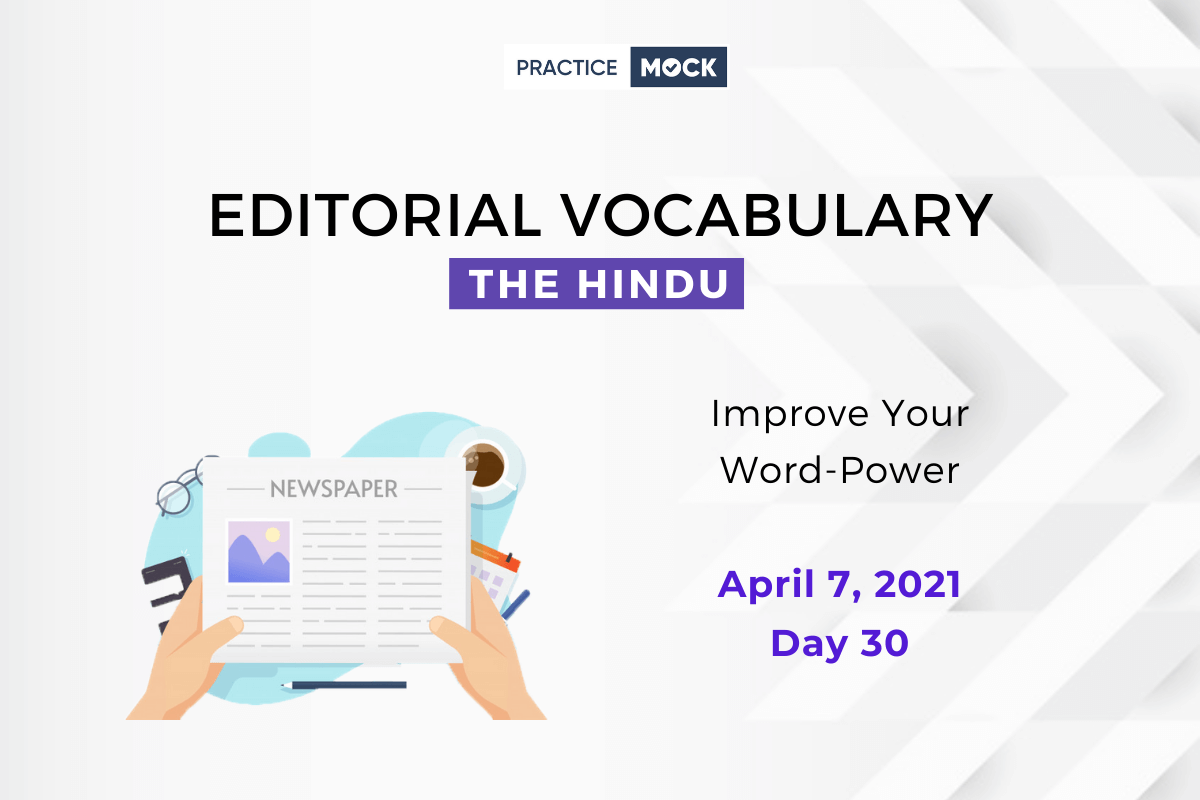Reading a newspaper’s editorial undoubtedly help you in a number of ways. But, stumble upon a difficult word/phrase and this task becomes tedious. To ease out your reading experience, we have come up with the below article which has the meaning of the difficult words/phrases just next to it. Let’s have a look at today’s editorial:
| Difficult Word/ Phrase | Contextual Meaning |
| Mayhem | violent or damaging disorder |
| Junta | a military or political group that rules a country after taking power by force |
| Call for | publicly ask for or demand something |
| Stop short of | not go as far as (some extreme action) |
| Attaché | a person on the staff of an ambassador, typically with a specialized area of responsibility |
| Gun down | shoot someone and kill or injure them |
| Bloodshed | the killing or wounding of people, typically on a large scale during a conflict |
| Unperturbed | not worried or anxious |
| Coup | a sudden, violent, and illegal seizure of power from a government |
| Usurp | take (a position of power or importance) illegally or by force |
Mayhem (violent or damaging disorder) in Myanmar: On the violence during Myanmar’s Armed Forces’ Day
India, China and countries in ASEAN should pressure the junta (a military or political group that rules a country after taking power by force) to restore democracy
The violence of March 27, Myanmar’s Armed Forces’ Day, in which over 100 protesters were killed, has sent shockwaves. India, which initially expressed its “deep concern” and called for (publicly ask for or demand something) the “rule of law” and “the democratic process” to be upheld, had stopped short of (not go as far as (some extreme action)) directly condemning the junta’s violence. It had also sent a representative to attend Saturday’s celebrations. But on the day India’s defence attaché (a person on the staff of an ambassador, typically with a specialized area of responsibility), along with the representatives of seven other countries, including China, Pakistan and Russia, was attending a massive military parade in Naypyidaw, the junta was gunning down (shoot someone and kill or injure them) its people. The violence and the prolonged crisis seem to have triggered a stronger response from several capitals, including New Delhi. On April 2, India, which has cultivated deep ties with Myanmar’s civilian and military leaderships, condemned “any use of violence” and called for “restoration of democracy”. There is growing international appeal for ending the bloodshed (the killing or wounding of people, typically on a large scale during a conflict), but the junta seems unperturbed (not worried or anxious). Even after the March 27 killings, protests and regime violence continue. According to independent agencies, the junta has killed over 570 civilians, including 46 children, since the February 1 coup (a sudden, violent, and illegal seizure of power from a government).
When the regime resorted to violence, it may have calculated that swift repression would extinguish the fire for freedoms, like in 1988 and 2007. But there is a fundamental difference this time. If in the past the protests erupted against the continuing military rule, in February, the military usurped (take (a position of power or importance) illegally or by force) power from an elected government after a decade of partial democracy. Those who enjoyed at least limited freedoms, first under the transition government and then under Aung San Suu Kyi, have built a stronger resistance to the junta this time. Street protests are not the only challenge the Generals are facing. The banking system is on the brink of collapse with most staff on strike. Cash is scarce and prices of essential goods are rocketing. Industrial workers are also on strike, bringing the pandemic-battered economy to its knees. The Generals’ efforts to bring bank and government employees and port and industrial workers back to work have been unsuccessful so far. Worse still, armed insurgent groups have thrown their weight behind the protesters, triggering fears of a wider civil conflict. The Generals are unlikely to give up power on their own. They should be nudged to end the violence and make concessions. Initially, India and China, both vying for influence in Myanmar, were ambivalent in condemning the junta’s violence because they did not want to antagonise the Generals. But an unstable Myanmar is not in the interest of any country. India, China and other countries in ASEAN should heap pressure on the junta and work towards restoring democracy in Myanmar, which is the only way forward.
Hope you got to know some new words/phrases which will definitely be useful in the English section of upcoming competitive exams. Wishing you all the best for your preparation!
Want to improve your vocabulary further? Download the Lists of Word-Meanings of Previous Months here.
- Sign Up on Practicemock for Updated Current Affairs, Free Topic Tests and Free Mini Mocks
- Sign Up Here to Download Free Study Material
Free Mock Tests for the Upcoming Exams
- IBPS PO Free Mock Test 2024
- RBI Grade B Free Mock Test 2024
- IBPS SO Free Mock Test 2024
- NABARD Grade A Free Mock Test 2024
- SSC CGL Free Mock Test 2024
- IBPS Clerk Free Mock Test 2024
- IBPS RRB PO Free Mock Test 2024
- IBPS RRB Clerk Free Mock Test 2024
- RRB NTPC Free Mock Test 2024
- SSC MTS Free Mock Test 2024
- SSC Strenographer Free Mock Test 2024
- GATE Mechanical Free Mock Test 2024
- GATE Civil Free Mock Test 2024
- RRB ALP Free Mock Test 2024
- SSC CPO Free Mock Test 2024
- AFCAT Free Mock Test 2024
- SEBI Grade A Free Mock Test 2024
- IFSCA Grade A Free Mock Test 2024
- RRB JE Free Mock Test 2024
- Free Banking Live Test
- Free SSC Live Test



